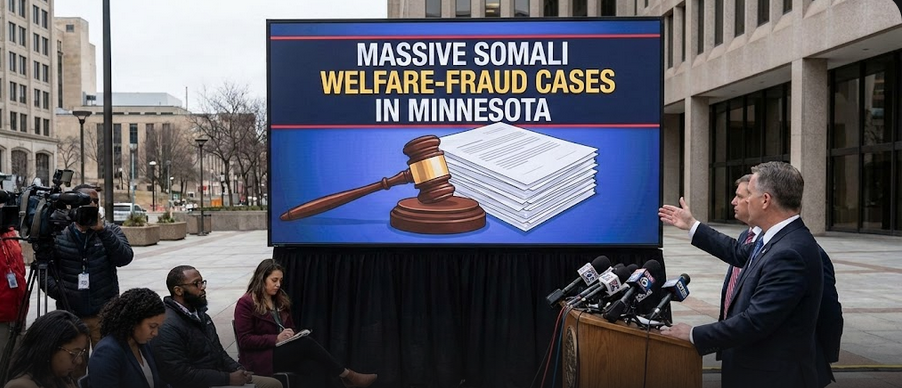Networks of fraudsters, many from Minnesota’s Somali community, exploited welfare programs—and raked in billions of taxpayer dollars, authorities say.
At least three major scandals are involved, one of which has been developing for years. Two others recently surfaced. Then came new revelations that inspired presidential action and touched off calls for further investigation.
Biggest Scandal of Its Kind
The Department of Justice (DOJ) said a Minnesota nonprofit called “Feeding Our Future” and its affiliates stole more than $240 million in federal funds, in what constituted the nation’s largest COVID-19 pandemic-relief scheme.
The defendants’ quarter-billion haul was used to buy “luxury cars, houses, jewelry, and coastal resort property abroad,” Luger said.
How Could This Happen?
Because schools were closed during the pandemic, officials relaxed rules for the Federal Child Nutrition Program and began allowing non-educational organizations to feed needy children.
Bad actors figured out how to take advantage. Feeding Our Future recruited people to open more than 250 nutrition-program sites throughout Minnesota. These locations “fraudulently claimed to be serving meals to thousands of children a day within just days or weeks of being formed,” the Justice Department said in 2022 when announcing the first wave of defendants.
To enroll in the program, and to receive and launder proceeds of the scheme, the defendants “created dozens of shell companies” in attempts to hide their fraud, which included submitting fake documentation, the Justice Department alleged.
Alarm bells started ringing after officials saw how fast the program was expanding for Feeding Our Future. In 2021, the organization received and disbursed $200 million—59 times more than the $3.4 million it handled in 2019, pre-pandemic.
The state’s education commissioner, Willie L. Jett II, defended his agency’s oversight of the programs. He said the agency reported suspicions and concerns to law enforcement.
Second Scandal Surfaces
Two months ago, the Justice Department released information on a separate scandal. It centers around millions in fraudulent Medicaid claims submitted through a program called Housing Stabilization Services. Eight initial defendants are accused, a Sept. 18 DOJ news release says.
In 2020, Minnesota became the first U.S. state to offer Medicaid coverage for finding and maintaining housing for senior citizens, people with disabilities, and those struggling with mental or substance-abuse disorders.
The program was intended to combat homelessness.
But crooks gamed the system.
They obtained names of eligible people from places such as addiction-treatment centers, then used that information to submit inflated, fake reimbursement claims, the Justice Department said.
The initial cost of the program was expected to be $2.6 million per year. But in 2021 alone, the program paid out nearly 10 times that amount, $21 million. That figure increased exponentially each year, reaching $104 million in 2024—nearly 40 times more than originally estimated.
Third Scheme Targeted Autism-Care Funding
Six days after announcing the Housing Stabilization Services accusations, Acting U.S. Attorney Joseph Thompson revealed charges in a third major welfare-fraud case. In that case, a 28-year-old woman is accused of illegally reaping $14 million from an autism-care program.
Prosecutors say that, from 2019-2024, Asha Farhan Hassan and her associates would recruit parents to get their children checked for autism. Every recruited child got that diagnosis, the DOJ said, unlocking federal reimbursements.
In exchange for cooperating with the scheme, parents received a monthly “kickback” of $300 to $1,500 per child, depending on how much money the federal government authorized for that child, the DOJ said.
The defendant and her partners allegedly split their ill-gotten gains, and Hassan “sent hundreds of thousands of dollars in fraud proceeds abroad, some of which she used to purchase real estate in Kenya,” the DOJ said.
Hassan is also accused in the Feeding Our Future case—an example of the intertwined nature of the Minnesota scandals, the DOJ said.
Massive Caseload Overwhelms DOJ Prosecutors
Many more defendants are expected to be charged in the latest two scandals, whose contributing factors have not yet been assessed.
Together, the three scandals “form a web that has stolen billions of dollars in taxpayer money,” Thompson said, lamenting “schemes stacked upon schemes, draining resources meant for those in need.”
“I have spent my career as a fraud prosecutor and the depth of the fraud in Minnesota takes my breath away,” Thompson said in one of the recent news releases.
During a news conference in September, a reporter asked Thompson whether the DOJ was getting extra help to handle the workload.
He replied that a small, dedicated team was working “extra hard.”
“We can’t prosecute our way out of this problem. These cases are resource-intensive,” Thompson replied.
“But can we charge everyone? No,” he said.
State Rep. Walter Hudson called that “an astounding statement,” which means that “injustice will stand.”
Are Somali Terrorists Benefiting?
House Speaker Mike Johnson (R-La.) said Nov. 21 that a new report revealed “truly disgusting” facts: “Millions in stolen Minnesota welfare dollars have been funneled to [Al-Shabab]— an ISIS-aligned TERROR group.”
Authored by Ryan Thorpe and Christopher Rufo, the Nov. 20 investigative article alleges that millions of the Minnesota welfare-fraud dollars “have been sent back to Somalia, where they ultimately landed in the hands of the terror group [Al-Shabab].”
The article cites “federal counterterrorism sources,” and said, “As one confidential source put it: ‘The largest funder of [Al-Shabab] is the Minnesota taxpayer.’”
In the article, Glenn Kerns, a retired Seattle police detective who worked 14 years on a federal terrorism task force, said a Somali money network runs from Seattle to Minneapolis.
Actions Taken and Requested
In the wake of those revelations, President Donald Trump on Nov. 21 halted temporary protected status—a deportation shield—for Somali immigrants in Minnesota.
A Somali-born congresswoman, Rep. Ihan Omar (D-Minn.), Minnesota Gov. Tim Walz, and other Democrats criticized Trump’s action. The state’s attorney general, Keith Ellison, questioned the legality of the president’s move and said he was considering what options he might pursue in response.
Omar, along with other Somalis, gathered to protest Trump’s order at the State Capitol Rotunda on Nov. 24.
Republican delegations in Minnesota and in Congress called upon the new U.S. Attorney for Minnesota, Daniel Rosen, to see whether the stolen welfare money could have gone to foreign terrorists.
State Rep. Kristin Robbins, a Republican candidate for Minnesota governor, has said that she and her constituents are concerned that additional welfare programs have been defrauded, too, including food stamps and child-care assistance.
“If you attempt to defraud our public programs and steal taxpayer dollars out from under the people who need them most—you will be stopped, and you will be held accountable,” the governor said in an Oct. 29 news release.











